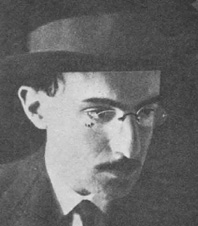
Fernando António Nogueira Pessoa (b. June 13, 1888 in Lisbon, Portugal — d. November 30, 1935 in the city of his birth) was a poet and writer, seen by many as one of the most notable Portuguese authors of all time. Critic Harold Bloom referred to him in the book The Western Canon as the most representative poet of the 20th century, along with Pablo Neruda. Pessoa is unique as an author due to the prevalence of heteronyms in his writing, with few of his poems being signed by himself.(excerpt from the Wikipedia entry for Fernando Pessoa).
Fernando Pessoa lived almost anonimously in Lisbon during the first third of the XX century. His work is still largely unknown abroad but once acquainted with it, few people will remain indiferent. Read below an amusing and entertaining account by Derek Suchard on how he came to know of Pessoa and take the opportunity of your stay in Lisbon to learn more about him and to roam through the cafés where he, the lonely crowd, once sat and mused: 'To create, I've destroyed myself... I'm the empty stage where various actors act out various plays'...
Years
and years ago, I was visiting my beloved in Amsterdam. For no particular reason,
we went one night to a little pizzeria (for the Amsterdam aficionado, it was just
off the Leidseplein, but no longer exists) after having visited the Atheneum bookstore
and having purchased a copy of Elizabeth Barrett Browning's Sonnets of the
Portuguese. The book lay on the table, dominating it in fact, given the surface
area. During a lull in the action, while she went to visit the facilities,
a waiter came by, and without so much as an "excuse me," picked up the book.
"Sonnets
of the Portuguese, eh?" he said.
"Yes," said I, always the master of a well-turned
phrase.
"These are Portuguese poems?"
"No," said I. "They're by Elizabeth
Barrett Browning. She's English. Well, she's dead now, of course, but she was
English. They called her the Portuguese because she was sick a lot and had to
go to Portugal to try and get better."
"I am Portuguese," he informed me.
"Oh,"
I said.
"You know who is the greatest poet in English language from this century?"
he asked. I paused. I was sitting in an Italian restaurant, in a Dutch city, with
a Portuguese waiter who was about to tell me -- confident as I was, in the arrogance
of youth, that I, long a student of English and English-language poetry, ought
to know that better than he. But I couldn't resist. "Who?" said I, pleased that
my linguistic flair had not abandoned me.
"Fernando Pessoa."
I'm sure I
must have grinned the same facetious grin shared by professors and teachers the
world over when confronted by students whose "little knowledge" has turned dangerous
and made them think they actually know something.
"Fernando Pessoa," I repeated.
"Yes,"
he said, mastering after a fashion my own linguistic leger de main. "Fernando
Pessoa. He's Portuguese."
"So," said I. "A Portuguese poet is the best poet
in English from the 20th century?"
"Yes," he replied.
At that moment, Liesbeth
returned, and, probably because someone at a nearby table was in urgent need of
a re-supply of garlic bread, the waiter, whose name I never did get, more's the
pity, left us.
The next day, while walking downtown, we passed near the public library.
Still puzzled by the conversation of the night before with the waiter,
I insisted we go in and see if we could find anything by this Pessoa fellow.
I did. A Penguin paperback (no longer on their backlist, alas). I went
through it, and found that the waiter was absolutely right. And not only
was he a great poet, but a weird one, too. For starters, he wrote in nineteen
separate personas, following the heteronymic theory of art, according
to which an "artist should be a synthesis of the varying personalities
that go to make up his own character"* (*Fernando Pessoa, Sixty
Portuguese Poems F.E.G. Quintanilha, editor, University of Wales Press
1973). Not all of the personas wrote poetry: some, including his own Pessoa
self, wrote other things, including metaphysics, logic, short stories,
etc. By his works shall ye know
him, however, and as founding secretary and sole member of the Fernando
Pessoa Revival Society, I humbly present extracts from two works. Both
are taken from the 1971 edition of Pessoa: Selected Poems, University
of Texas Press, A.A. Parker, editor. (...visit
the original page)